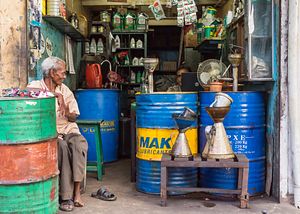Plummeting global oil prices have generated much discussion over the past few weeks. Oil is an important driver of global geopolitics: Washington hopes sanctions on Moscow’s oil-dependent economy will help the West get its way in Ukraine. In the Middle East, a good part of the battle against the Islamic State revolves around the amount of oil under its control. A few thousand miles away, the South China Sea simmers over oil as much as it does over maritime control.
The Organization of Petroleum-Exporting Countries (OPEC) last month voted not to cut output, which suggests that the price free-fall has probably just begun. That’s bad news for oil-dependent economies around the world, from Russia to Algeria. Venezuela’s Foreign Minister Rafael Ramirez, for one, glumly accepted OPEC’s decision as a collective one, after his bid to cut oil output by as much as 2 million barrels per day failed to pass.
But an altogether different scene is unfolding in New Delhi, where policymakers and economists alike are celebrating the fall in oil prices. There is a very real reason to celebrate, of course. India is now the world’s third-largest crude oil importer, having surpassed Japan last year. As much as three-quarters of India’s crude oil comes from outside the country. In the last financial year alone, the country spent $150 billion, importing almost 4 million barrels a day of crude oil. Revolutions in the Middle East all through last year had kept the Indian economy on a knife’s edge. The rupee suffered historic lows as imports continued to rise. Many remembered that some of India’s biggest financial crises in the past were either sparked or sustained by oil imports.
Falling oil prices, though, is perfect for Prime Minister Narendra Modi, who incidentally announced subsidy cuts on India’s fuel consumption only recently. In a report this September, Morgan Stanley noted that a 10 percent drop in crude oil prices would bring New Delhi’s current account deficit down by 0.6 percent of GDP. “Every $10-a-barrel change in oil price changes fuel subsidy in India by $6.5 billion,” said the report. The Modi government ran for elections earlier this year on the plank of deregulating the oil market and reducing costly subsidies. If there was ever a time to cash in and fulfill that promise, it’s now.
But it’s not just Modi who has much to gain from falling oil prices. This could possibly be the big boost India’s economy badly needed. Cheaper oil would mean lower costs of production, higher consumer spending, and an overall rise in investment and growth, in industries as diverse as textiles and aviation.
One of the greatest impediments to the “Make in India” campaign is the shortage of energy in India. Forty-four percent of India’s energy consumption in 2012 came from coal. But following a controversy over the allocation of coal blocks in the country, the Supreme Court of India earlier this year cancelled more than 200 coal block allocations made by the government in the last two decades. In the meantime, India’s energy shortage has only become more serious. Much of this could be offset by the fall in global oil prices, enabling India to import more crude oil at a lower cost for its industrial sector – a much needed fillip for the “Make in India” campaign.
To be sure, cheaper oil will not rejuvenate the Indian growth story on its own. For India to rejuvenate its economy, much greater structural reforms are needed: in the bureaucracy, where painstaking red tape discourages investors, in the flailing infrastructure sector, which needs heavy investment, and even in the stifling environmental legislation passed in India, which does more harm to business than it does good to the environment. All this needs tackling at the policymaking level. Nonetheless, for a reform-minded Indian government, the tumble in oil prices could not have come at a better time. New Delhi now needs to take advantage of its good fortune, and roll out the red carpet for greater investment.
Mohamed Zeeshan is a student of engineering at VIT University, India and a commentator on issues of Indian and international governance.

































